All RVers who either use or store their rigs in climates where temperatures can fall to freezing or below need to winterize their RVs, one way or another. Some prefer to use RV antifreeze, while others prefer to blow out their RV water lines with compressed air. In today’s post, we’ll look at the pros & cons of winterizing by blowing out RV water lines vs antifreeze. Temps are falling as we type ❄️, so let’s not waste any time and get right to it!
- 1) Is It Better To Winterize an RV With Air or Antifreeze?
- 2) What Are the Advantages of Blowing Out RV Water Lines With Air?
- 3) What Are the Disadvantages of Blowing Out RV Water Lines With Air?
- 4) What Are the Advantages of Using RV Antifreeze to Winterize?
- 5) What Are the Disadvantages of Using RV Antifreeze to Winterize?
- 6) How Do The RVgeeks Winterize Their RV?
- 7) Should I Blow Out My RV Water Lines or Use Antifreeze?
Is It Better To Winterize an RV With Air or Antifreeze?
Determining which method is better is not a simple task, as there’s a fair amount of subjectivity involved. In fact, neither method is better or worse than the other in general. Each has its advantages and disadvantages.
Most RVers tend to choose one method or the other based on what works best for them, and then stick with it.
Let’s take a look at the advantages and disadvantages of each method of winterizing, and you can let us know in the comments section at the end of this post which method is preferable from your perspective.
What Are the Advantages of Blowing Out RV Water Lines With Air?
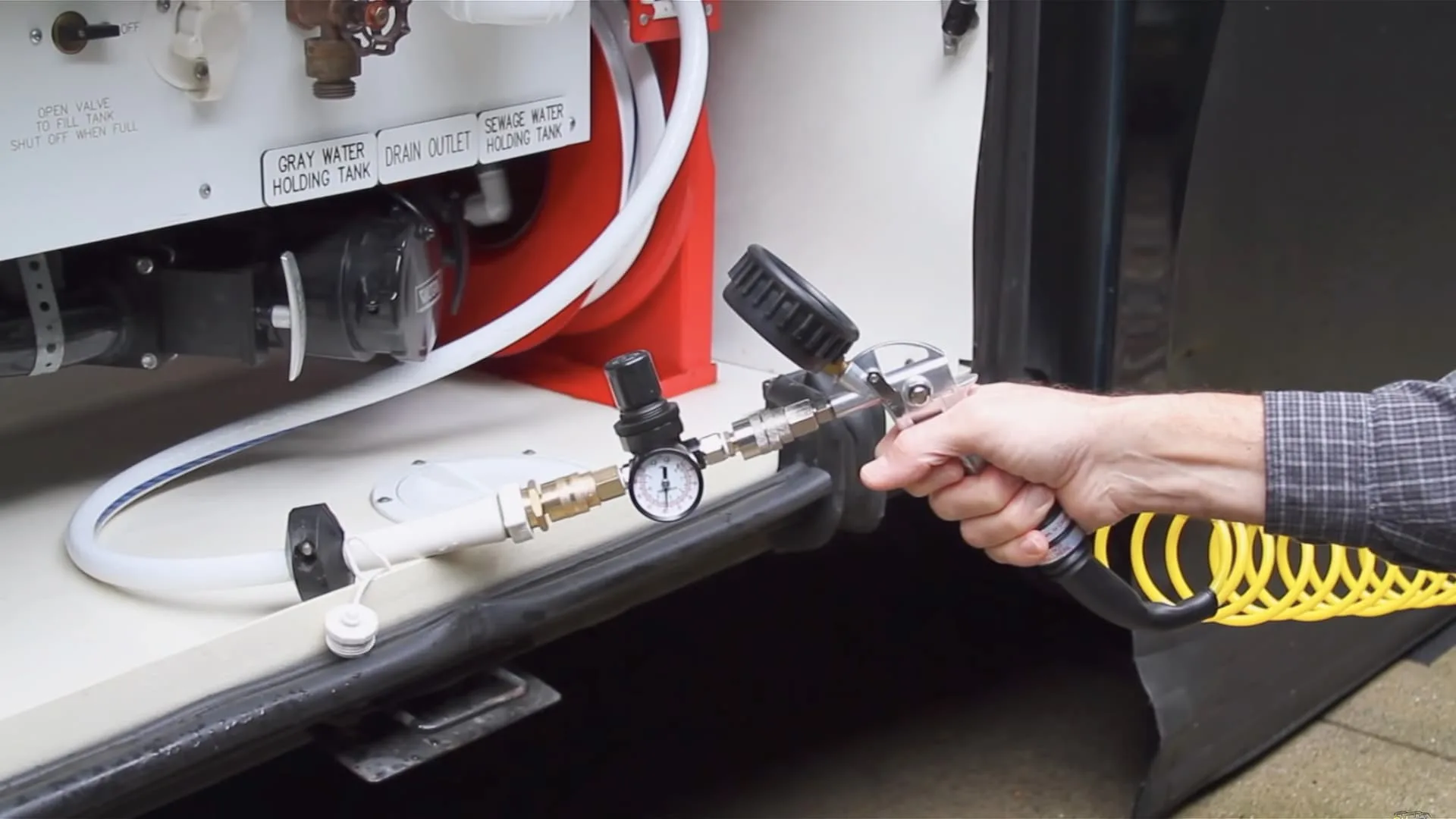
Blowing out the RV water lines with compressed air is one way to winterize your RV.
There are several advantages to using compressed air to blow out RV water lines. These are the most impactful:
No Antifreeze Needed
Perhaps the most obvious benefit to blowing out RV water lines with compressed air is that there’s not a lot of antifreeze involved. You’ll notice that we didn’t say there’s no antifreeze involved. Your P-trap drains, toilet(s), and some appliances (washing machine, dish washer, etc) require some antifreeze, so there’s very little antifreeze involved, especially compared to using antifreeze to winterize the entire RV plumbing system.
This not only saves you money every year but also is more environmentally friendly.
De-Winterizing is Faster and Easier
When it’s time to de-winterize your RV, if you’ve blown out your water lines instead of using antifreeze, the process is much faster and easier. You literally just hook it up to city water (or refill the fresh tank) and use it like normal!
There’s no need to run the plumbing system dry of the antifreeze, no need to dump lots of antifreeze into the sewer system (or otherwise dispose of it), and no need to complete a thorough flush of the entire system.
This can be particularly handy if you occasionally use your RV during the winter season, but return it to its storage location where it might see freezing temps when not in use.
No Lingering Taste or Odor of Antifreeze
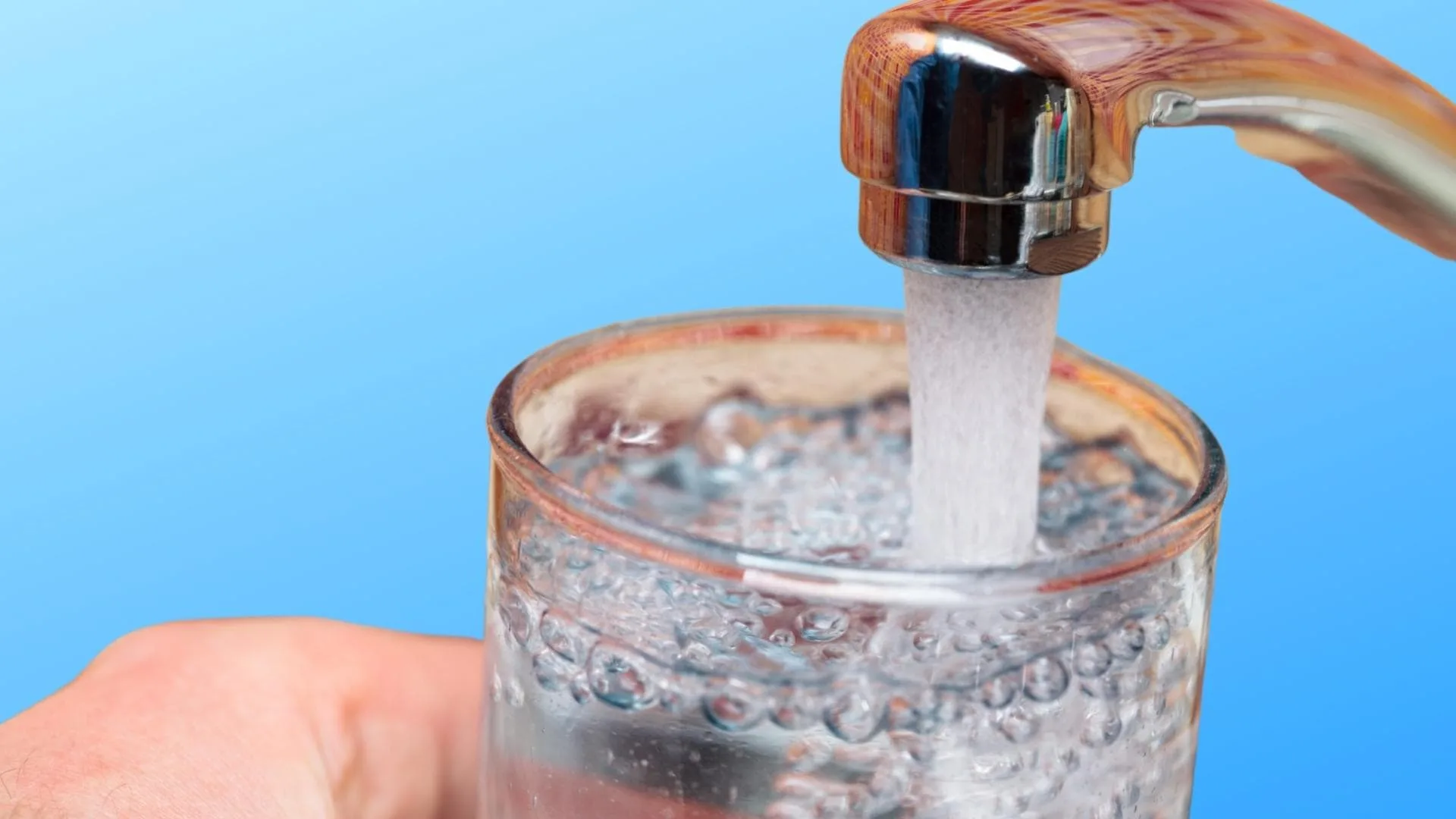
When you blow out your RV water lines with compressed air, there’s no lingering taste or odor of antifreeze after de-winterizing.
When blowing out RV water lines vs using antifreeze, because there’s no antifreeze in the fresh water lines, there’s no risk of a lingering taste or odor in your water after de-winterizing.
The little bit of antifreeze you use in the p-traps, drains, and toilet doesn’t linger in your pipes all winter and doesn’t affect your fresh water use.
Lower Annual Cost
As noted above, there’s less cost involved in blowing out RV water lines vs using antifreeze because you’re not buying antifreeze every fall, and you also don’t have to dump gallons of antifreeze at a dump station after de-winterizing.
Yes, you do need to purchase a suitable air compressor to handle the job. But, since all RVs and/or their tow/towed vehicles have tires, you need one of those anyway!
What Are the Disadvantages of Blowing Out RV Water Lines With Air?
As with anything, there are also disadvantages to blowing out RV water lines vs using antifreeze. Let’s take a look at some of the downsides.
May Not Eliminate Potential of Freeze Damage If Not Done Thoroughly
If an RV is stored (or used) in freezing or sub-freezing temperatures with any regularity at all, the system needs to be blown out properly and completely. If not, then the potential for pipes and valves to freeze remains a risk.
Low points, valve seals, and other plumbing components may be prone to retaining some amount of water if not completely & thoroughly blown out. This could be disastrous and expensive if pipes should crack or valves should fail. Especially if they’re hidden inside a wall somewhere… you won’t know the crack exists until you’re using the RV and see water dripping (or POURING) out of somewhere in your RV!
Not As Good As Using Antifreeze If Stored In Sub-Freezing Temps For Extended Periods
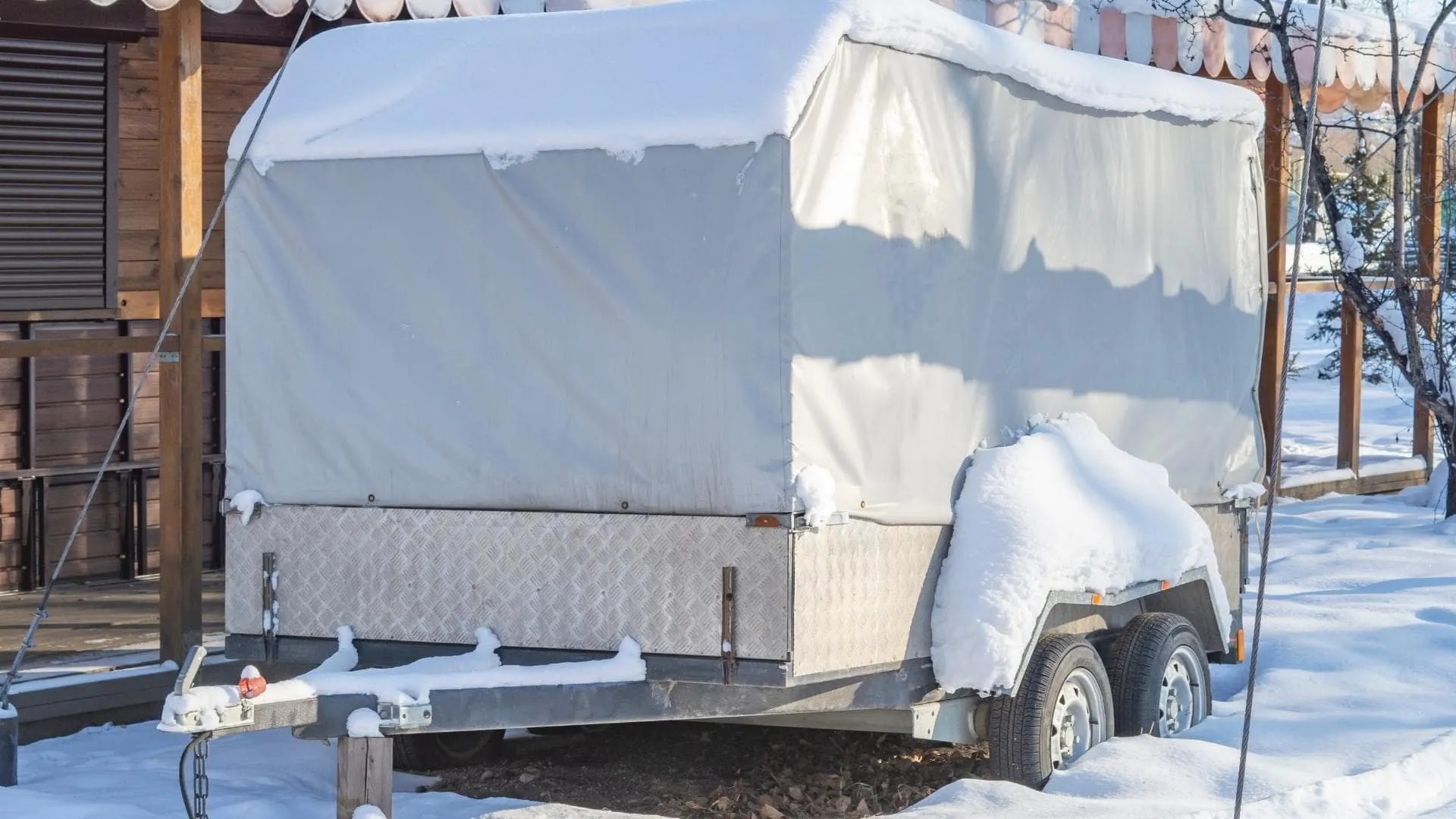
When an RV is stored in freezing or sub-freezing temperatures for an extended period of time, using RV antifreeze to winterize the rig is more effective than blowing out the water lines.
When a rig is stored in sub-freezing climates for an extended period, winterizing with antifreeze is the better option as it’s more protective to the entire water system. Running the antifreeze through all of the plumbing in the RV ensures that every component is protected.
Still Need to Use Some Antifreeze
As previously noted, when blowing out RV water lines, some antifreeze needs to be used, so you still need to have some on hand every year for this purpose.
Risk of Blowing Contamination Into Plumbing With Certain Compressors
Certain types of air compressors can blow oil or other contaminants into the plumbing system, so if you don’t use the appropriate type of compressor (or install an inline filter) when blowing out your RV’s water lines, you run this risk as well.
What Are the Advantages of Using RV Antifreeze to Winterize?
Let’s take a brief look at the most prominent advantages of using antifreeze to winterize your RV vs blowing out the water lines with an air compressor.
Most Sure-Fire Way to Protect Plumbing From Freezing in Cold Climates
No matter how you slice it, the most sure-fire way to protect your rig’s plumbing system from freezing is to use RV antifreeze. This is especially true if you’ll be storing (or using) your rig in (extended) sub-freezing temperatures for the winter.
This may be a good time to note that some RVers use their campers all winter long for short trips. They use antifreeze to winterize the rig, AND to flush the toilet while they’re winter camping. They bring along their drinking and bathing water, which they heat on the propane stove.
So, antifreeze is not only used for storing an RV in cold winter climates, but also for using it.
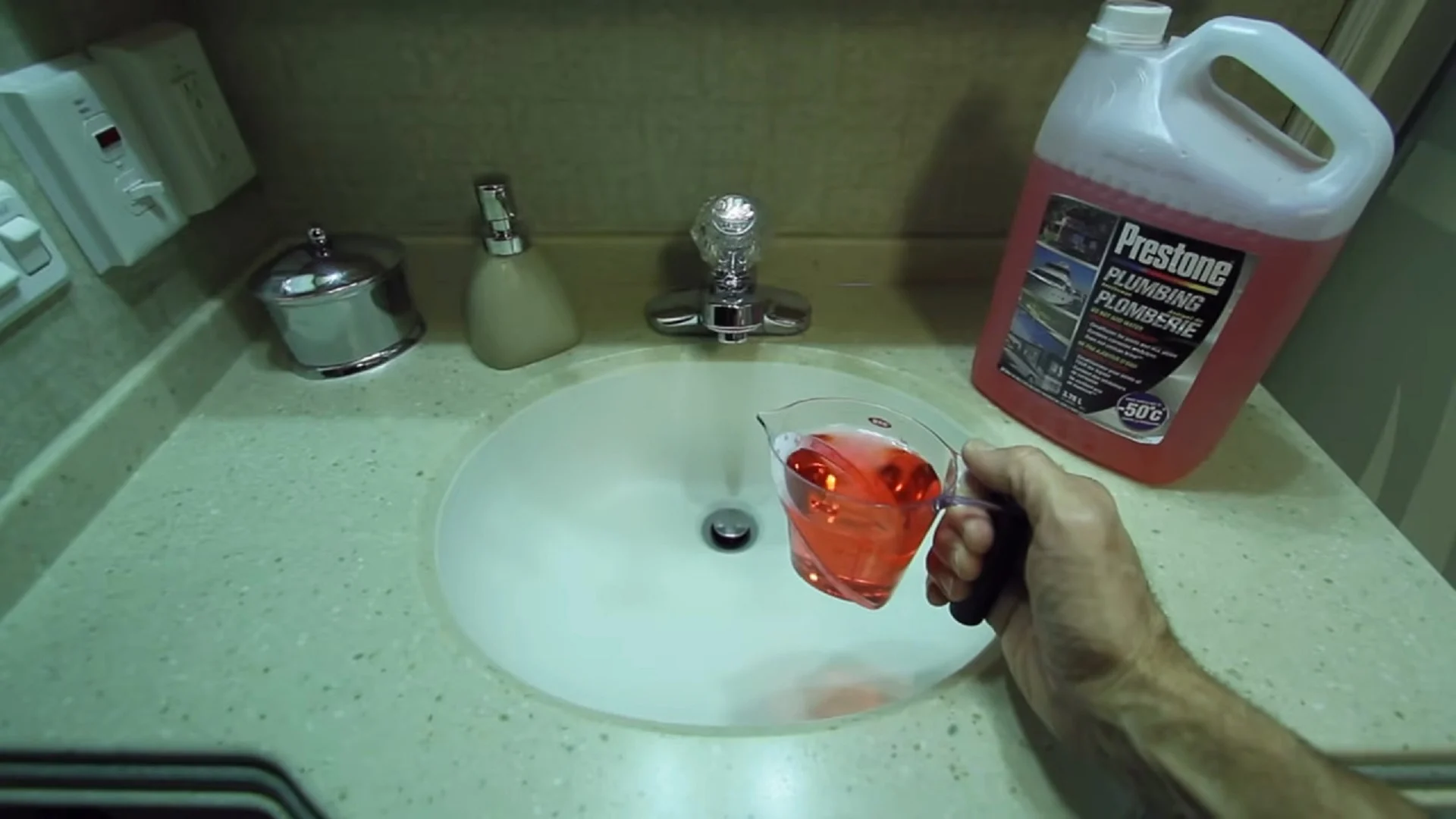
RV antifreeze is readily available, and can be used to winterize an RV that will be used for cold-weather camping.
RV Plumbing Antifreeze Is Readily Available
Fortunately, RV antifreeze is readily available and not difficult to obtain. Most big box stores carry it as well as auto parts stores and hardware stores.
What Are the Disadvantages of Using RV Antifreeze to Winterize?
By now the disadvantages of using RV antifreeze to winterize may be obvious, but let’s run through them just briefly.
Must Purchase RV Plumbing Antifreeze Annually
Foremost, you have to buy antifreeze every year. This is an additional expense for the RVer. You also need to properly dispose of the antifreeze, so a trip to a dump station (or full hook-up campsite) in the spring could be another expense. Want to know how much antifreeze you’ll need to complete the job? Check out our article on the topic: How Much RV Antifreeze Do I Need To Winterize My RV Plumbing?
More Work to De-Winterize
It’s more work to de-winterize an RV that’s been winterized with RV antifreeze. In addition to running all of the antifreeze from the lines into the holding tanks and dumping the tanks, it’s important to flush the lines (sometimes more than once) and sanitize them.
While RV antifreeze is non-toxic, nobody wants to drink it, cook with it, or wash with it on purpose. Proper flushing and sanitizing as part of the de-winterizing process takes time and energy.
Taste/Odor May Linger After De-Winterizing
Despite flushing, the taste and odor of RV antifreeze can sometimes linger following the de-winterizing process. Again, this isn’t dangerous, but it can be unpleasant, and it will require additional flushing and sanitizing of the system.
Environmental Issues Associated With Antifreeze
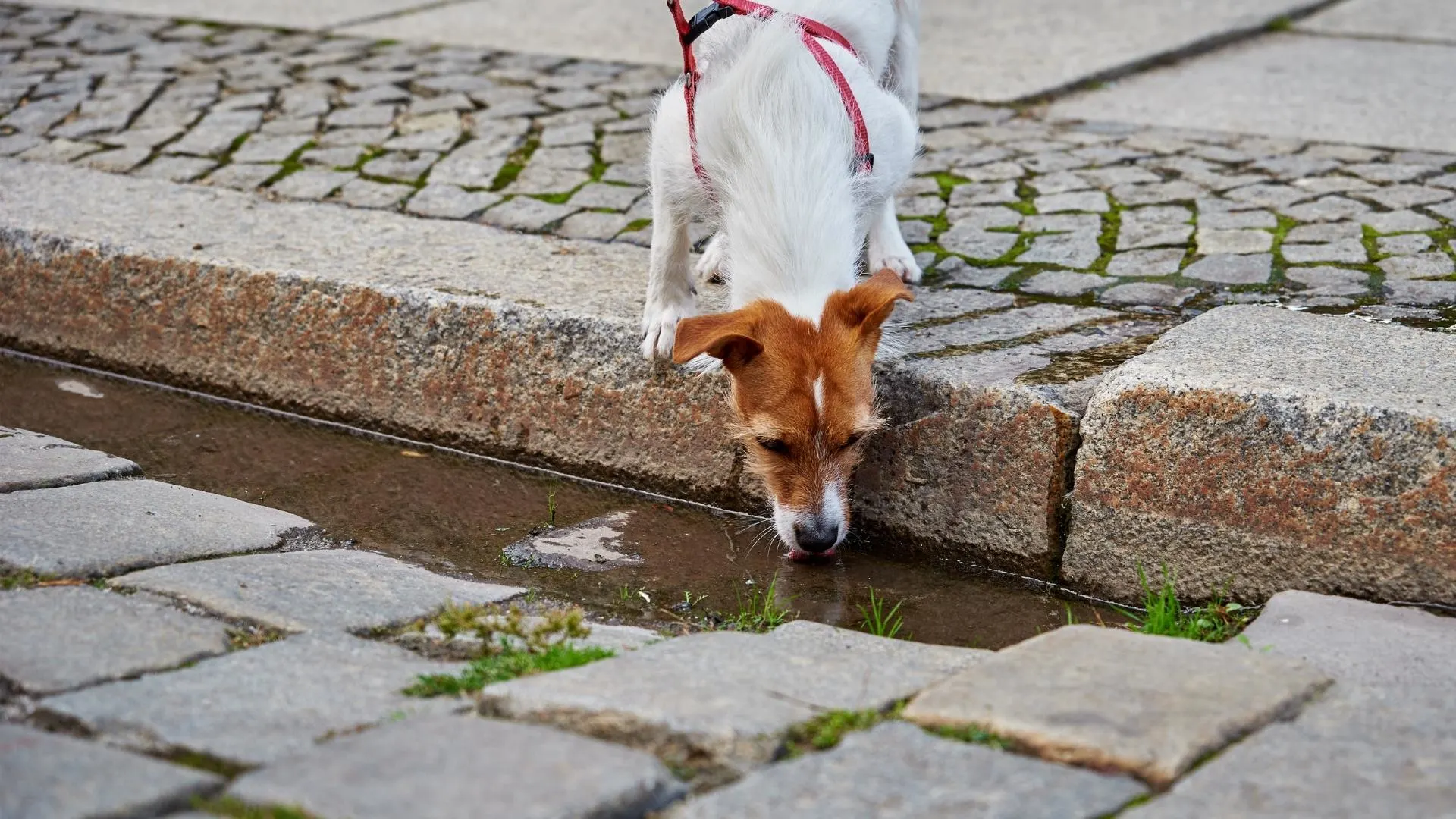
While RV antifreeze is non-toxic to humans, animals are attracted to its sweet smell and taste, and its consumption can be harmful to them.
Despite the fact that RV antifreeze is non-toxic to humans, it’s not good for the environment in general, including nearby plant life or animals who are attracted to its sweet taste, not to mention the millions of plastic antifreeze containers heading for the landfill each year.
How Do The RVgeeks Winterize Their RV?
We prefer blowing out our RV water lines vs using antifreeze to winterize our rig, but as we mentioned at the beginning of this post, this preference is based on how we use our rig in the winter. We aren’t people who store our RV for the winter in a cold climate (heck, we’re full-time snowbirds, so our RV is usually treated to a warm & sunny winter).
We live full-time in our RV and we only store it when we travel by air for a brief period. We also don’t tend to winter camp or store our rig outside in freezing temperatures. We have spent time camping in cold temperatures, and we’ve got the receipts to prove it.
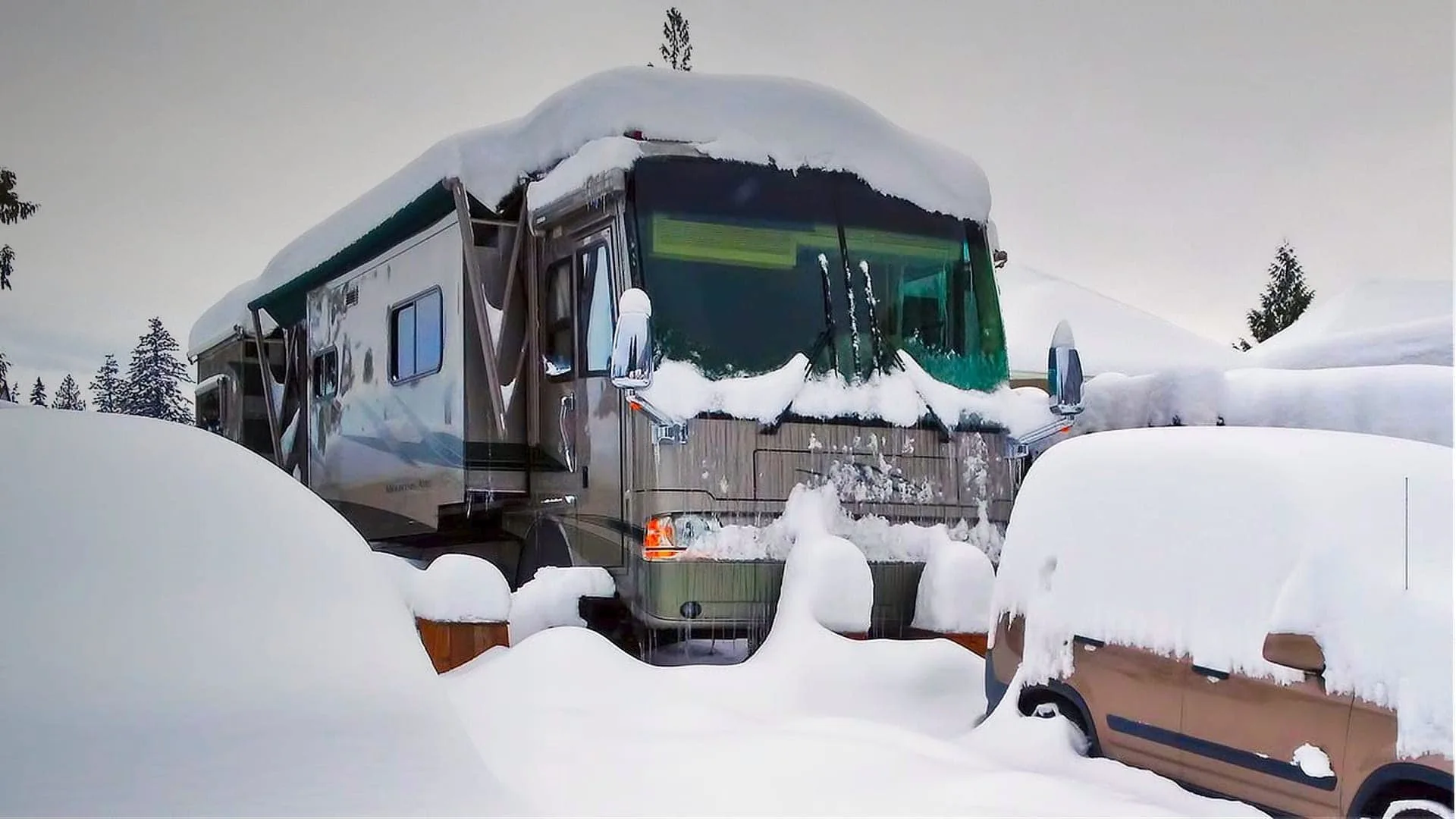
Yeah, it was relatively cold in this camping spot… and our backs are STILL sore from shoveling all that snow!
But we generally don’t store our motorhome outside in freezing temperatures for an extended period of time. So, it’s important to consider all of this information when you hear us saying that we prefer to winterize by blowing out our RV’s water lines.
With all of that said, we use our Viair 400P-RV to blow out the water lines in our rig.
- PORTABLE *AUTOMATIC* COMPRESSOR for RVs & TRAILERS (Model: 40047, 150 PSI, Class C Tires) - Hit the open road with a reliable 12V air compressor,...
- POWER YOUR JOURNEY: Versatile Air Compressor for RVs & More. The 400P-RV Portable RV Air Compressor is your go-to solution for inflating tires on RVs,...
This has worked very well for us and we couldn’t be happier with the 400P-RV as both an air compressor for inflating our RV & towed car tires and as a winterization tool.
Viair even has this winterization kit available to make it easy to winterize your RV using your 400P-RV.
- RV Winterization Kit
- Protects your RV’s water system from freezing during the long winter months
If you’d like to watch the entire process as we blow out our RV water lines using our Viair compressor (and a little RV antifreeze!), we’ll leave this right here for you:
Should I Blow Out My RV Water Lines or Use Antifreeze?
As always, this depends on where you’re using or storing your rig, for how long, and what you’re comfortable with. For optimal security in sub-freezing temperatures, using RV antifreeze is the way to go.
But those of you who neither store nor use your RV in cold climates can choose the method that works best for you, all things considered.
Geek Out with Us Every Week
Join our newsletter to learn about all things RV-related. Every week we offer free tips, tricks, product reviews, and more to our online community of RVers. So, whether this is your first time on the road or you’re a seasoned expert, we’d love for you to geek out with us!




Russell
Friday 24th of November 2023
It is clear that blowing out the lines will work for most of the lines, but being that you have a water pump in there with a check valve on it how do you actually get the water out of the water pump? And also everything that's downhill from the water pump how would you be getting that water out of the lines being that you're having to blow air through the water pump and it has a check valve on it?
TheRVgeeks
Monday 27th of November 2023
Hi Russell. Good question. There are two ways that you can handle that. If you watch our video, you'll see that we just used the pump to run itself dry... which clears enough of the water out of the lines (the one between the pump and the tank as well as the lines from the pump to the plumbing connection point). You can see that starting at the 7:54 point in the video (here's a link right to that spot: https://youtu.be/fyjFAFFe7xs?si=Gce9hSRULY3S1_vQ&t=474).
The other option is to use the winterizing kit that came with your RV (hopefully)... or that you install yourself aftermarket. Those kits are installed in the line between the fresh tank and the water pump and include a valve that diverts the pump's intake line to another length of tubing (designed to be put into a container of antifreeze to suck the antifreeze into the plumbing without having to put antifreeze in the fresh water tank). Thus, you can use that intake hose to blow air through the water pump (leaving a faucet open somewhere so the air & water have somewhere to go) to clear it out.
Hope that helps!
Vera and Phil
Saturday 30th of September 2023
We always blew out our old unit and (knock on wood) never had any issues. We store outdoors in Michigan. We now have a new unit and are considering using antifreeze however we’ve had several people say they don’t use it because they feel it’s what attracted critters (the sweet smell). Is that even possible when it’s in your water lines??
TheRVgeeks
Tuesday 3rd of October 2023
Good question, Vera and Phil! We wouldn't think that the antifreeze in the plumbing was likely to attract rodents... but we also wouldn't be surprised that they could smell even the smallest of residues of any antifreeze that was spilled or leaked out somewhere. Their sense of smell is staggeringly good.
Maybe there's a rodent expert out there who has some time to chime in? 🐁😁
Jerry
Friday 24th of December 2021
Unfortunately my Aquahot unit doesn’t allow for blowing out with air. They state that antifreeze must be used.
TheRVgeeks
Saturday 25th of December 2021
Thanks for that info, Jerry. Hadn't heard that the Aquahot shouldn't be blown out.
Jon Eisenberg
Friday 24th of December 2021
We're in Minnesota so with temps that can fall to 0 to -20, we definitely do both. Any bits of water left in fixtures and fittings can expand and crack causing expensive repairs. So we blow out all we can and then add antifreeze which fills the lines and flushes out (and "outnumbers") any last bit of water. Antifreeze is very cheap insurance, and really not hard at all to get out of the lines in the spring.
Wolfe Rose
Sunday 18th of September 2022
I also do BOTH in Upstate NY... and BY putting antifreeze into "dry" lines, I recover almost pure antifreeze in the spring. It doesn't get diluted much, and since I put a little into DRY (blown with shopvac) p-traps which I don't recover there's a slow refreshing anyway.
TheRVgeeks
Friday 24th of December 2021
Hi Jon! Our best wishes for a happy holiday season, which in your case includes not freezing in arctic weather!
Ed J.
Friday 24th of December 2021
Hello, many other issues were left out of this review. What do you set the air unit PSI at? Does the air unit have a holding tank which could be too small for the job? Air attachments that would be required. You need two people to do a good job with air plus you should run through the water system at less twice to make sure you completed the winterization. The inside person needs to work all devices that use water to winterize correctly. If not, you'll find out in the spring what you miss and how much that mistake will cost you. I have use air on my last four 5th wheels and three travel trailers. we have only made 2 mistakes so far. One last thing that we do is open all faucets, we don't use the ice makers due the poor water at campground, run the water pump and remove its filter for the winter and open all low water points and leave the water tank open both values. I only use one bottle of red pop for the drains. You need to read the reviews on rv antifreeze. They will and do freeze. so, watch what you buy. Cheaper is not better.
TheRVgeeks
Friday 24th of December 2021
Hi Ed. As the title of the article is "Blowing Out RV Water Lines vs RV Antifreeze" it's a comparison of the pros & cons of winterizing with anti-freeze vs compressed air, not a tutorial on how to do it. That said, a very thorough tutorial video is included/embedded as part of the article, which provides step-by-step instructions on the method we use, which is compressed air.